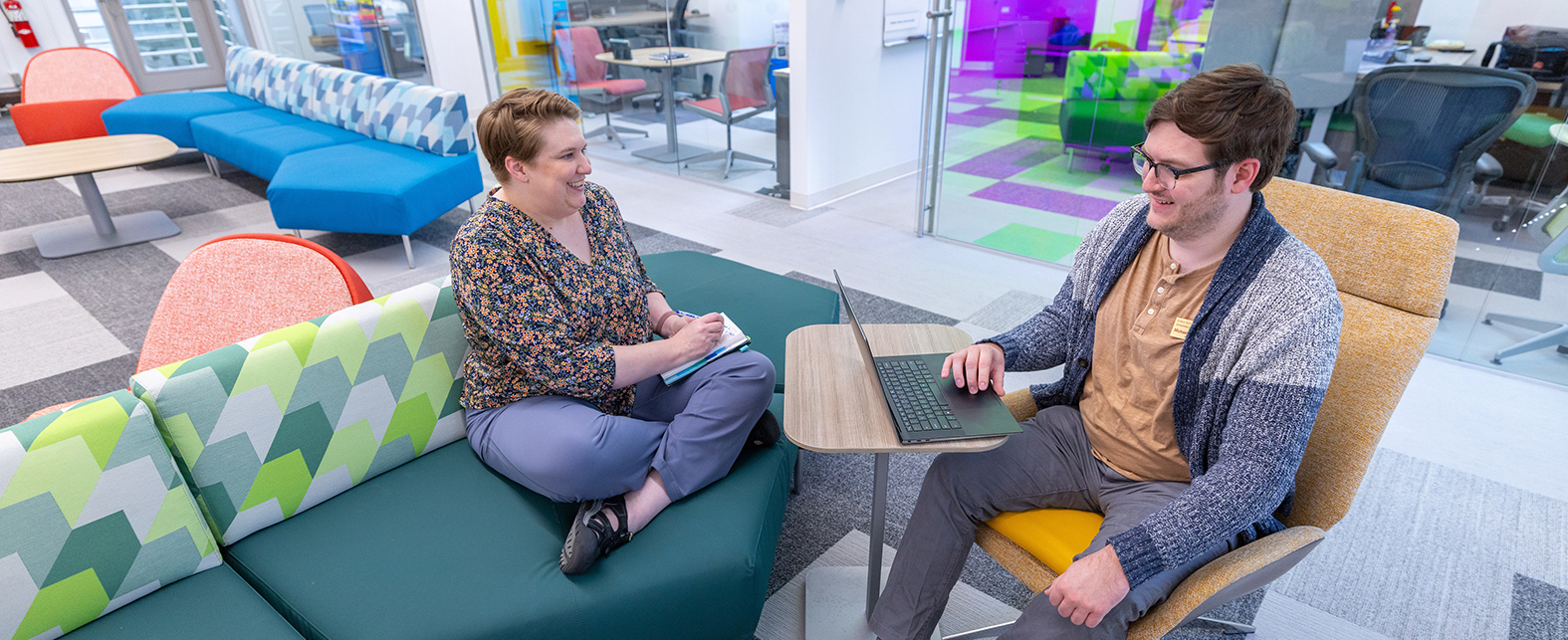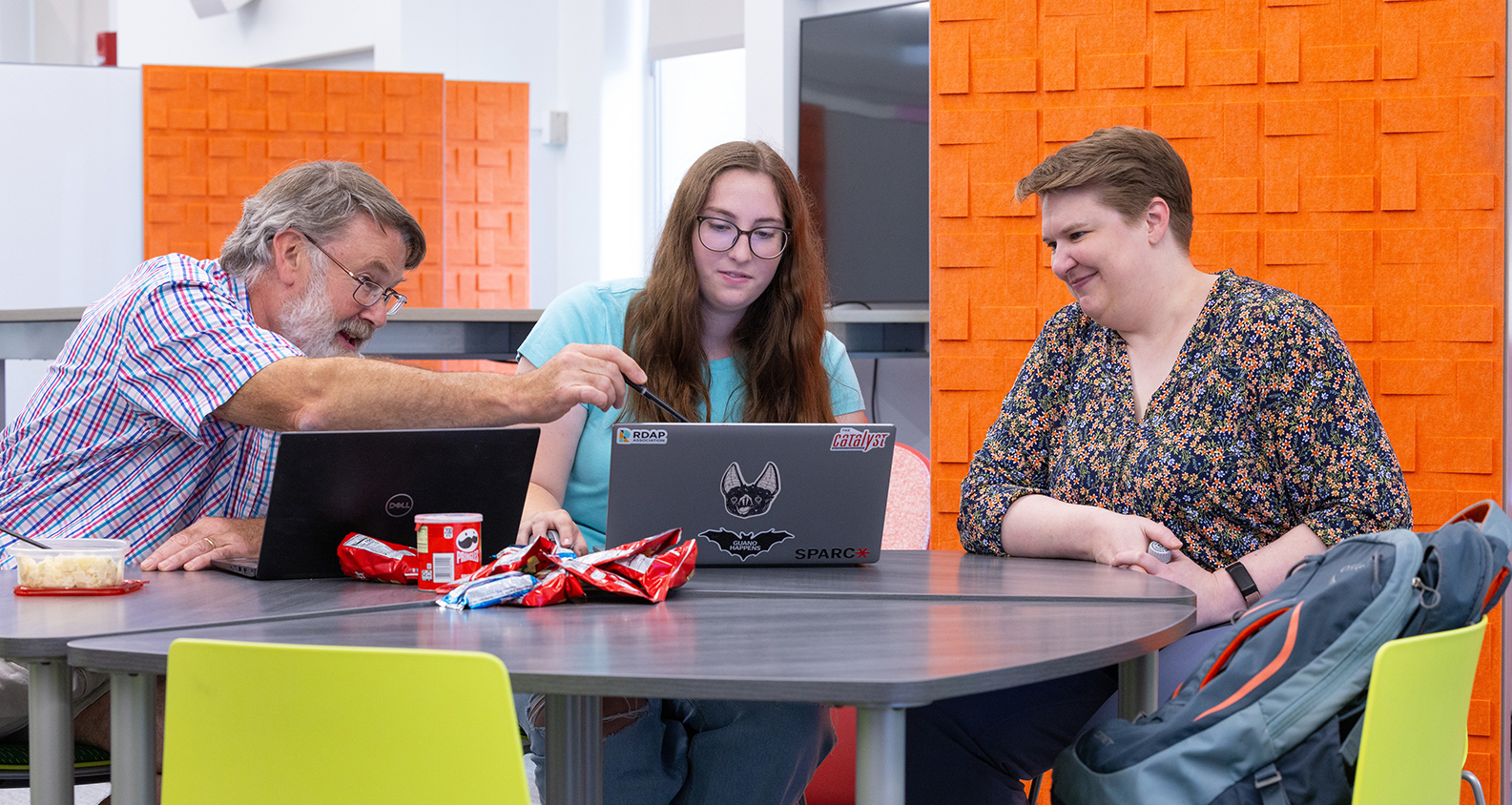Catalyst Advances Iowa State Research
Author: Melea Reicks Licht and M. Monica Gillen
Author: Melea Reicks Licht and M. Monica Gillen

Megan O'Donnell, research data services lead, and Michael Cummings, digital scholarship librarian, are among the staff who collaborate in the Catalyst, a space for specialized research and instruction services.
The role of the academic library continues to evolve in the digital age, and the Iowa State University Library has adapted to be on the leading edge. From creating data management plans, to boosting citations, the University Library advances Iowa State research.
Much of that work happens in the Catalyst in Parks Library. It’s a dynamic crossroads where library experts form meaningful partnerships with innovators from across campus to spark exploration and connection.
Launched in spring 2022, thanks to funding from The Roy J. Carver Charitable Trust of Muscatine, Iowa, and private donors, the Catalyst space on the main level of Parks Library offers a modern welcome and backdrop for countless learning opportunities.
Work that happens in the Catalyst falls into three main categories:
Data management plans set researchers on a successful course from day one by securing needed competencies and resources. University Library data experts are available to help researchers at every level from ambitious undergrads, to seasoned staffers, to tenured faculty. In addition to helping researchers plan for and manage data, the team is familiar with policies of funding agencies which may require data plans and open data sharing.
University Library staff offer workshops each semester on data management as well as online resources. Learning sessions held in person and online cover helpful practices and tools for creating backups, organizing, naming, documenting, and “futureproofing.”
“We started offering drop-in events in the Catalyst because these are topics and problems everyone is working through,” said Megan O’Donnell, research data services lead. “We can learn from each other and if my staff and I can't help, we might be able to connect you to someone who can.”
Statistical Solutions is one such weekly drop-in event that stemmed from the working relationship fostered between Philip Dixon, statistics professor, and O’Donnell. Researchers like Dalena Rogers, a graduate student in horticulture, stop by the Catalyst during these events to consult with experts and get project advice.
“I am so much more confident in the usage of the data I collected to answer my research questions and to produce an accurate and relevant answer to how certain treatments impact germination,” Rogers said. “This will be so helpful as I pursue a career in coastal restoration, conservation and marine ecosystems, and community education.”
The University Library provides long-term, open access to the university’s research data through DataShare, a collaboration with campus Information Technology Services and the Office of the Vice President for Research. DataShare meets or exceeds current federal requirements to share research data, provides a secure platform for peer review of data, and is free for Iowa State students and staff.
DataShare offers campus partners the opportunity to evaluate and approve data before it’s shared – a step that is uncommon in similar workflows elsewhere. The Office of Innovation Commercialization, Office of Research Ethics, and Ames Laboratory review relevant submissions to ensure licensing and patenting opportunities are not missed and that the shared data doesn’t violate research policy contracts. Once cleared by these offices, University Library staff help faculty prepare their data for upload on DataShare.
“DataShare provides our researchers a chance to professionally share research data, scripts, and code with the world. We can link it to books, articles, and theses and dissertations – creating a bridge that ensures research transparency and accountability. Or we can publish stand-alone datasets that further both our land grant mission as well as research collaboration and innovation,” said O’Donnell.
Through DataShare, data produced by Iowa State researchers is connected to services that boost its visibility and impact by tracking citations, views, downloads, and other altmetric data for each published dataset.

Philip Dixon (left), University Professor of statistics, and Megan O’Donnell (right), research data services lead, provide drop-in guidance on data management and research design to students like Rachel Aird, electrical engineering.
The Iowa State University Digital Repository is the Open Access system to collect, manage, share, preserve, and provide free access to scholarship created by students, staff, and faculty. Expert library staff devoted to each college curate and maintain this robust database. Because material in the Digital Repository is free to access worldwide, there is potential for it to be read and cited more often than research restricted to subscribers.
“Scholars send us their publications list and we check the copyright status of their work and upload it on their behalf,” said Anne Shelley, unit lead and digital repository services librarian. “Because unit staff are assigned certain departments, we become familiar with individual faculty, some norms of their discipline, and the self-archiving policies of particular publishers.”
The Digital Repository is managed by the University Library Digital Scholarship and Initiatives Department and supported by the Office of the Vice President of Research. Contents include journal articles, conference proceedings, book chapters, theses, dissertations, and more.
The Iowa State University Digital Press is an Open Access scholarly press housed in the Catalyst that publishes original work such as books, textbooks, journals, and conference proceedings.
“The specialized environment has enhanced our collaboration with scholars and significantly boosted the visibility and impact of our projects,” said Harrison Inefuku, scholarly publishing services librarian. “We’ve seen an increase in innovative research resulting in additional publications, and the Catalyst continues to be a hub for groundbreaking digital scholarship.”
Throughout the past fiscal year publications available from the ISU Digital Press were downloaded more than one million times (1,042,456) by users from across the globe. The book “New Information Technologies, Simulation and Automation” by Ukrainian authors was the most popular last year, with 5,666 downloads.
Digital scholarship is an interdisciplinary approach that integrates digital tools and methods into research, instruction, and publication in order to gain insights that are not possible with analog methods alone. Examples of digital scholarship include using geospatial analysis, data visualization, and digital storytelling to foster critical thinking, discovery, and digital literacy in teaching and research.
University Library staff in the Digital Scholarship and Initiatives Department help researchers, students, and instructors by:
Staff in the Catalyst have been prolific in creating programming for workshops – with over 30 sessions scheduled just this semester – and fostering cross-disciplinary collaborations. They’ve brought together experts from fields such as statistics, botany, history, and data science. These relationships foster an environment where pioneering research can thrive.
Work continues through campus partnerships, data-driven collections, and scholarly communication as University Library digital experts continue their crucial role in advancing open science and Iowa State research.